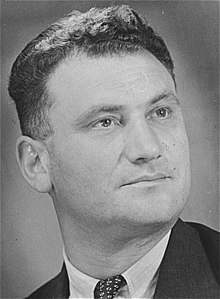Tuvie Bielski
| Tuvia Bielski | |
|---|---|
 |
|
| Born |
May 8, 1906 Stankiewicze, near Novogrudok, Russian Empire (Now Belarus) |
| Died | June 12, 1987 (aged 81) United States |
| Known for | Bielski partisans |
| Parent(s) | David and Beila Bielski |
| Relatives |
Asael Bielski, brother Alexander Zeisal Bielski, brother Aron Bielski, brother |
Tuvia Bielski (May 8, 1906 – June 12, 1987) was the leader of the Bielski group, Jewish partisans who set up a camp for Jews fleeing the Holocaust during World War II. Their camp was situated in the Naliboki forest, which was part of Poland between World War I and World War II, and which is now in western Belarus.
Bielski grew up in the only Polish Jewish family in Stankiewicze. The small village in Eastern Poland (now Western Belarus) is located between towns of Lida and Navahrudak, both of which housed Jewish ghettos during World War II.
Tuvia was the son of David and Beila Bielski, who had 12 children: 10 boys and two girls. Tuvia was the third eldest. His brothers Asael, Alexander ("Zus") and Aron were later to become members of his partisan group.
During the First World War, Bielski served as an interpreter for the Imperial German Army, which were occupying the western territories of the Russian Empire. Already a speaker of Yiddish, he learned to speak the German language from these men and remembered it all his life. In 1927, he was recruited into the Polish Army, where he eventually became a corporal in the 30th Infantry Battalion. After completing his military service, Bielski returned home. In an effort to add to his family's income, he rented another mill. This income was still inadequate, so in 1929, at the age of 23, he married an older woman named Rifka who owned a general store and a large house. The couple lived in the nearby small town of Subotniki.
...
Wikipedia
